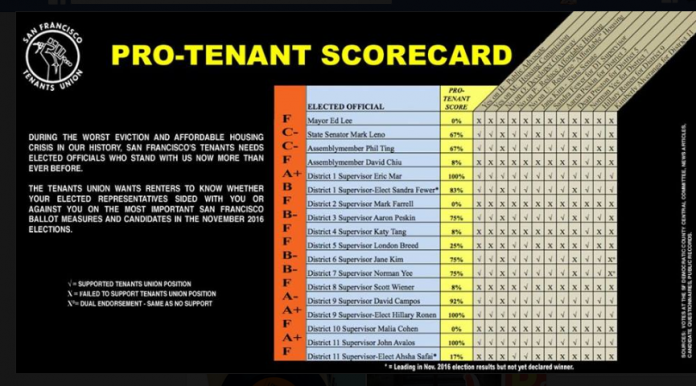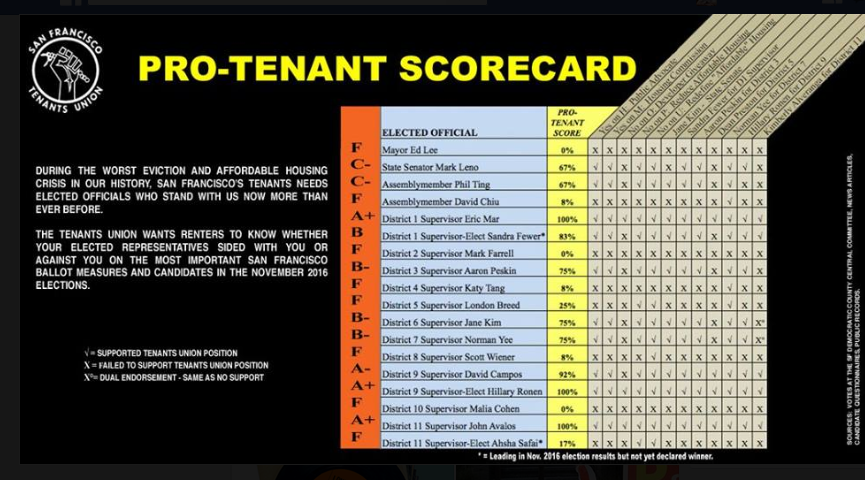
There are lies and misleading statements in every election, and San Francisco has seen its share. But this fall’s contests featured a particularly painful version: Some candidates who are very much part of the moderate, pro-landlord, pro-Big-Tech side of things tried to convince the voters that they were “progressives.”
The nice thing is that their lies suggest that the left has won the debate on the issues. The ugly thing is that words like “progressive” matter, because they define a very clear ideology, and when they are stolen by people who have a very different world view, it damages the political debate and cheapens the language that we all need to help us understand the two clear factions now at City Hall.

Josh Arce, who ran for supe in D9, put out a mailer with a picture of himself and his opponent, Hillary Ronen, under the headline “a pair of progressives.” Nothing could be more untrue; Arce has been on the conservative side of local politics, and had the support of the conservative pro-real-estate folks.
Scott Wiener, who won the state Senate race, put out a mailer that made it look as if he had been endorsed by the Bay Guardian and was pro-tenant; every tenant group in town, along with the Bay Guardian, endorsed his opponent, Jane Kim.
And in D11, Ahsha Safai, who is a real-estate speculator and house-flipped backed by the real-estate industry and Big Tech, promoted himself as a union guy.
So we need a bit more objective criteria for these contests, and the Tenants Union has a good start. The group has put out a voting scorecard for local elected officials that shows where they all were on the critical issues this fall – the ballot measures and, equally important, the endorsements.
You don’t get to call yourself pro-tenant if you go out and support anti-tenant candidates and causes.
You can get a pretty high-rest version here.
The scorecard shows Mayor Ed Lee with a Zero score. State Assemblymember David Chiu gets only 8%, as does his friend and ally Sup. Scott Wiener. Sup. London Breed, who ran as a tenant advocate, actually got 25%; Safai got 17%.
We need more of this in SF; the groups that track and endorse candidates ought to be keeping track of all the votes and endorsements, so that when election time comes around, we can have what I have begged for: A little honesty.
The Board of Supes has another chance Tuesday/29 to make clear that the future of development in the Mission has to be re-evaluated – and based on the most recent precedent, it’s hard to see how they can let the latest project go forward.
Two weeks ago, the board, in a dramatic move, demanded a full environmental review of a project at 1515 South Van Ness, mostly on the grounds that the Eastern Neighborhoods Plan, which authorizes a ton of development in a wide swath of the city, is way out of date.
By a 9-0 vote, the board said, in effect, that city planners have failed to look at the impacts of all the changes that have happened to the city since that plan was adopted in 2007.
Back then, of course, we were in a deep recession, there were no Google buses, no Twitter tax break, no Uber or Lyft.
As we noted:
That spells the end of the Eastern Neighborhoods Plan, puts every other developer in the area on notice, and sends a signal to the Planning Department that displacement and gentrification have to be a central concern for all project approvals.
So now we go to Chapter Two: The same people who challenged the 1515 South Van Ness Plan – The Calle 24 Latino Cultural District Community Council – are asking the supes to slow down a project at 2675 Folsom, a couple of blocks away.
The 117-unit project, with mostly market-rate luxury housing, cleared the Planning Commission on a 5-2 vote, with Commissioners Myrna Melgar and Kathrin Moore in opposition.
The project has faced strong opposition from the start, for much of the same reason that Calle 24 opposed the Valencia St. project: the Mission is overwhelmed with too much market-rate housing, which is causing displacement of both working-class people and longtime small businesses.
The Planning Department’s response has been, in effect: too bad. Nothing we can do about that.
But there is, and it started two weeks ago. And if this project’s developers want to have any chance of getting a shovel in the ground, they are going to have to radically alter what they are offering.
And if the city wants this much more market-rate housing in the Mission, it’s going to have to do a new, detailed area EIR that looks seriously at displacement and offers real, credible mitigations for a community that is being destroyed, one big building at a time.
On Thursday/1, the Government Audit and Oversight Committee holds a hearing on alternatives to the new jail, which the supes rejected. In the Age of Trump, this is a crucial: San Francisco is going to face huge financial and political impacts from Washington, and any hope of addressing the homeless crisis will depend in significant part on local decisions. That will require a major investment in mental-health services, and building a new facility that’s under the criminal-justice system to handle mentally-ill people may not be the best solution.
San Francisco has a chance to make a major national statement here, but it’s critical we get it right.

Yes.
This is far from an “honest tenant scorecard.”
For one thing, only two of those 12 positions would clearly benefit any tenants (no on P and U). The other positions may be good indications that the candidate identifies as the same brand of Progressive as the Tim Redmond and SFTU, but they are not unambiguously pro-tenant.
For another thing, the scorecard does not list which data come from which sources, and it does not say which data were simply not available (e.g. Ed Lee’s row of ✗s). And some of the data appears to conflict with the sources; for example, a number of the politicians who voted to endorse Peskin and Fewer at the Aug 17, 2016 DCCC meeting are marked with ✗ instead of ✓ on the scorecard.
Finally, the table is unnecessarily polarizing because it does not distinguish between opposition and non-endorsement. It gives the message that “You’re either for us, or against us.” This does not lead to respectful dialogue.
By the way, by the logic of the SFTU, the voters also get an F with a 50% score.
This is far from an honest tenant scorecard.
For one thing, only two of those 12 positions would clearly benefit any tenants (no on P and U). The other positions may be good indications that the candidate identifies as the same brand of Progressive as the Tim Redmond and SFTU, but they are not unambiguously pro-tenant.
For another thing, the scorecard does not list which data come from which sources. And some of the data appears to conflict with the sources; for example, David Chiu’s proxy at the Aug 17, 2016 DCCC meeting made the same endorsements as SFTU on Peskin, M, P, and U, yet the scorecard marks those checkmarks as with an X. There appear to be more discrepancies as well.
Finally, the table is unnecessarily polarizing because it does not distinguish between opposition and lack of available data. It gives the message that “You’re either for us, or against us.” I doubt that it will give rise to respectful dialog.
By the way, by the logic of the SFTU, the voters also get an F with a 50% score.
Stop calling them “moderates” they are corporate democrats.
Progressive equals pro-tenant?